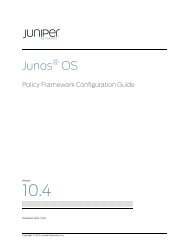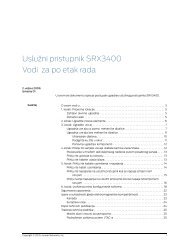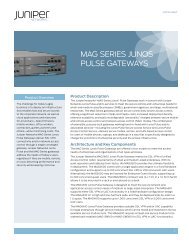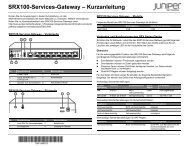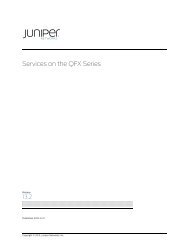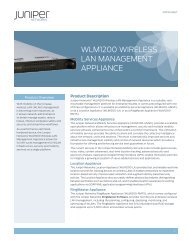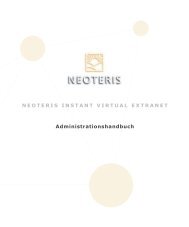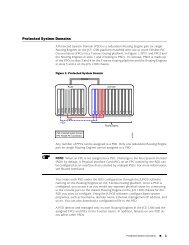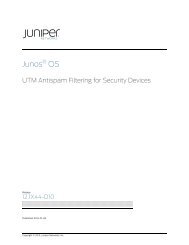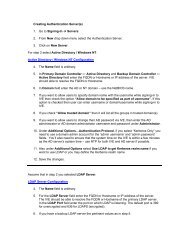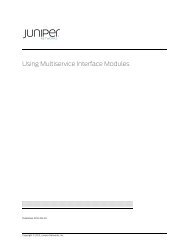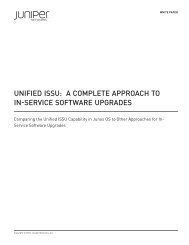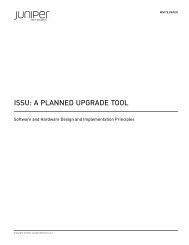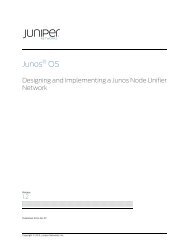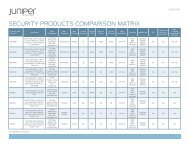- Page 1 and 2:
Junos ® OS Interfaces Command Refe
- Page 3 and 4:
Abbreviated Table of Contents About
- Page 5 and 6:
Table of Contents About This Guide
- Page 7 and 8:
Part 2 Ethernet Interfaces Chapter
- Page 9 and 10:
clear pppoe statistics . . . . . .
- Page 11 and 12:
Chapter 23 Tunnel Services Interfac
- Page 13 and 14:
About This Guide This preface provi
- Page 15 and 16:
Supported Platforms Using the Index
- Page 17 and 18:
Table 2: Text and Syntax Convention
- Page 19 and 20:
PART 1 About Interfaces Copyright
- Page 21 and 22:
CHAPTER 1 Interface Types Interface
- Page 23 and 24:
type-fpc/pic/port.logical • J Ser
- Page 25 and 26:
Discard Interface Related Documenta
- Page 27 and 28:
TX Matrix Plus Router Internal Ethe
- Page 29 and 30:
Table 5: M Series and T Series Rout
- Page 31 and 32:
Table 5: M Series and T Series Rout
- Page 33 and 34:
NOTE: Point-to-Point Protocol over
- Page 35 and 36:
Copyright © 2012, Juniper Networks
- Page 37 and 38:
Services Interfaces Link states) ar
- Page 39 and 40:
Table 8: M Series and T Series Serv
- Page 41 and 42:
CHAPTER 2 Common Interface Commands
- Page 43 and 44:
clear interfaces interval Syntax cl
- Page 45 and 46:
clear interfaces statistics Syntax
- Page 47 and 48:
show interfaces brief Syntax show i
- Page 49 and 50:
show interfaces descriptions Syntax
- Page 51 and 52:
show interfaces destination-class S
- Page 53 and 54:
show interfaces detail Syntax show
- Page 55 and 56:
Copyright © 2012, Juniper Networks
- Page 57 and 58:
Output Fields For more information,
- Page 59 and 60:
Sample Output show interfaces exten
- Page 61 and 62:
Copyright © 2012, Juniper Networks
- Page 63 and 64:
Copyright © 2012, Juniper Networks
- Page 65 and 66:
Sample Output show interfaces exten
- Page 67 and 68:
Sample Output show interfaces exten
- Page 69 and 70:
show interfaces filters Syntax show
- Page 71 and 72:
show interfaces interval Syntax sho
- Page 73 and 74:
Copyright © 2012, Juniper Networks
- Page 75 and 76:
show interfaces media (PTX Series P
- Page 77 and 78:
Sample Output show interfaces polic
- Page 79 and 80:
Table 17: Layer 2 Overhead, Transmi
- Page 81 and 82:
Required Privilege Level For Gigabi
- Page 83 and 84:
Table 18: show interfaces queue Out
- Page 85 and 86:
Table 19: Byte Count by PIC Type (c
- Page 87 and 88:
show interfaces queue (Fast Etherne
- Page 89 and 90:
Copyright © 2012, Juniper Networks
- Page 91 and 92:
Copyright © 2012, Juniper Networks
- Page 93 and 94:
Copyright © 2012, Juniper Networks
- Page 95 and 96:
show interfaces queue both-ingress-
- Page 97 and 98:
show interfaces queue ingress (Giga
- Page 99 and 100:
show interfaces queue remaining-tra
- Page 101 and 102:
show interfaces queue (Channelized
- Page 103 and 104:
Copyright © 2012, Juniper Networks
- Page 105 and 106:
Copyright © 2012, Juniper Networks
- Page 107 and 108:
Copyright © 2012, Juniper Networks
- Page 109 and 110:
Copyright © 2012, Juniper Networks
- Page 111 and 112:
show interfaces queue (QFX Series)
- Page 113 and 114:
Copyright © 2012, Juniper Networks
- Page 115 and 116:
Table 20: show interfaces routing O
- Page 117 and 118:
show interfaces routing detail (TX
- Page 119 and 120:
Copyright © 2012, Juniper Networks
- Page 121 and 122:
Sample Output show interfaces routi
- Page 123 and 124:
show interfaces routing-instance Sy
- Page 125 and 126:
show interfaces snmp-index Syntax s
- Page 127 and 128:
Sample Output show interfaces sourc
- Page 129 and 130:
Sample Output show interfaces stati
- Page 131 and 132:
show interfaces statistics detail (
- Page 133 and 134:
show interfaces statistics detail (
- Page 135 and 136:
show interfaces statistics (SONET/S
- Page 137 and 138:
show interfaces statistics (Aggrega
- Page 139 and 140:
show interfaces terse Syntax show i
- Page 141 and 142:
show interfaces terse (PTX Series P
- Page 143 and 144:
CHAPTER 3 Common Output Fields Comm
- Page 145 and 146:
Copyright © 2012, Juniper Networks
- Page 147 and 148:
• SNMP-Traps—SNMP trap notifica
- Page 149 and 150:
RPF Failures Field Source Class Fie
- Page 151 and 152:
PART 2 Ethernet Interfaces Copyrigh
- Page 153 and 154:
CHAPTER 4 Ethernet Interface Operat
- Page 155 and 156:
Table 24: Ethernet Interface Operat
- Page 157 and 158:
Table 24: Ethernet Interface Operat
- Page 159 and 160:
clear lacp statistics Syntax clear
- Page 161 and 162:
clear interfaces mac-database stati
- Page 163 and 164:
clear oam ethernet connectivity-fau
- Page 165 and 166:
clear oam ethernet connectivity-fau
- Page 167 and 168:
clear oam ethernet connectivity-fau
- Page 169 and 170:
clear oam ethernet link-fault-manag
- Page 171 and 172:
clear protection-group ethernet-rin
- Page 173 and 174:
Table 25: ping ethernet Output Fiel
- Page 175 and 176:
equest interface (revert | switchov
- Page 177 and 178:
equest protection-group ethernet-ap
- Page 179 and 180:
equest protection-group ethernet-ap
- Page 181 and 182:
equest protection-group ethernet-ap
- Page 183 and 184:
Table 26: Aggregated Ethernet show
- Page 185 and 186:
Table 26: Aggregated Ethernet show
- Page 187 and 188:
show interfaces brief (Aggregated E
- Page 189 and 190:
show interfaces extensive (Aggregat
- Page 191 and 192:
show interfaces (far-end-interval)
- Page 193 and 194:
show interfaces (Fast Ethernet) Syn
- Page 195 and 196:
Table 28: show interfaces Fast Ethe
- Page 197 and 198:
Table 28: show interfaces Fast Ethe
- Page 199 and 200:
Table 28: show interfaces Fast Ethe
- Page 201 and 202:
Table 28: show interfaces Fast Ethe
- Page 203 and 204:
Table 28: show interfaces Fast Ethe
- Page 205 and 206:
Table 28: show interfaces Fast Ethe
- Page 207 and 208:
Table 28: show interfaces Fast Ethe
- Page 209 and 210:
Copyright © 2012, Juniper Networks
- Page 211 and 212:
Table 29: show interfaces Gigabit E
- Page 213 and 214:
Table 29: show interfaces Gigabit E
- Page 215 and 216:
Table 29: show interfaces Gigabit E
- Page 217 and 218:
Table 29: show interfaces Gigabit E
- Page 219 and 220:
Table 29: show interfaces Gigabit E
- Page 221 and 222:
Table 29: show interfaces Gigabit E
- Page 223 and 224:
Table 29: show interfaces Gigabit E
- Page 225 and 226:
Sample Output show interfaces (Giga
- Page 227 and 228:
show interfaces extensive (Gigabit
- Page 229 and 230:
Copyright © 2012, Juniper Networks
- Page 231 and 232:
show interfaces (10-Gigabit Etherne
- Page 233 and 234:
Table 31: show interfaces Gigabit E
- Page 235 and 236:
Table 31: show interfaces Gigabit E
- Page 237 and 238:
Table 31: show interfaces Gigabit E
- Page 239 and 240:
Table 31: show interfaces Gigabit E
- Page 241 and 242:
Table 31: show interfaces Gigabit E
- Page 243 and 244:
Table 31: show interfaces Gigabit E
- Page 245 and 246:
Table 31: show interfaces Gigabit E
- Page 247 and 248:
Copyright © 2012, Juniper Networks
- Page 249 and 250:
show interfaces extensive (10-Gigab
- Page 251 and 252:
show interfaces extensive (10-Gigab
- Page 253 and 254:
APS/PCC0: 0x02, APS/PCC1: 0x42, APS
- Page 255 and 256:
... Copyright © 2012, Juniper Netw
- Page 257 and 258:
Output Fields For more information,
- Page 259 and 260:
Sample Output show interfaces exten
- Page 261 and 262:
Copyright © 2012, Juniper Networks
- Page 263 and 264:
Copyright © 2012, Juniper Networks
- Page 265 and 266:
Sample Output show interfaces exten
- Page 267 and 268:
Sample Output show interfaces exten
- Page 269 and 270:
show interfaces interface-set (Ethe
- Page 271 and 272:
show interfaces interface-set queue
- Page 273 and 274:
show interfaces interface-set queue
- Page 275 and 276:
show interfaces interface-set queue
- Page 277 and 278:
show interfaces interface-set queue
- Page 279 and 280:
show interfaces diagnostics optics
- Page 281 and 282:
Table 36: Gigabit Ethernet Bidirect
- Page 283 and 284:
Table 36: Gigabit Ethernet Bidirect
- Page 285 and 286:
Table 37: Gigabit Ethernet SFP show
- Page 287 and 288:
Table 38: 10-Gigabit Ethernet Trans
- Page 289 and 290:
Table 39: 10-Gigabit Ethernet XFP T
- Page 291 and 292:
Table 39: 10-Gigabit Ethernet XFP T
- Page 293 and 294:
show interfaces diagnostics optics
- Page 295 and 296:
Copyright © 2012, Juniper Networks
- Page 297 and 298:
Table 40: show interfaces irb Outpu
- Page 299 and 300:
Table 40: show interfaces irb Outpu
- Page 301 and 302:
show interfaces irb snmp-index Copy
- Page 303 and 304:
show interfaces targeting (Aggregat
- Page 305 and 306:
show lacp interfaces Syntax show la
- Page 307 and 308:
Table 42: show lacp interfaces Outp
- Page 309 and 310:
show lacp statistics Syntax show la
- Page 311 and 312:
show interfaces mac-database (Gigab
- Page 313 and 314:
Table 44: show interfaces mac-datab
- Page 315 and 316:
show interfaces mc-ae Syntax show i
- Page 317 and 318:
show oam ethernet connectivity-faul
- Page 319 and 320:
Sample Output show oam ethernet con
- Page 321 and 322:
show oam ethernet connectivity-faul
- Page 323 and 324:
show oam ethernet connectivity-faul
- Page 325 and 326:
show oam ethernet connectivity-faul
- Page 327 and 328:
Table 48: show oam ethernet connect
- Page 329 and 330:
Table 48: show oam ethernet connect
- Page 331 and 332:
show oam ethernet connectivity-faul
- Page 333 and 334:
show oam ethernet connectivity-faul
- Page 335 and 336:
Table 49: show oam ethernet connect
- Page 337 and 338:
show oam ethernet connectivity-faul
- Page 339 and 340:
Table 50: show oam ethernet connect
- Page 341 and 342:
Table 50: show oam ethernet connect
- Page 343 and 344:
show oam ethernet connectivity-faul
- Page 345 and 346:
(enhanced continuity measurement) C
- Page 347 and 348:
Output Fields Table 51 on page 329
- Page 349 and 350:
show oam ethernet connectivity-faul
- Page 351 and 352:
Copyright © 2012, Juniper Networks
- Page 353 and 354:
show oam ethernet connectivity-faul
- Page 355 and 356:
show oam ethernet connectivity-faul
- Page 357 and 358:
Table 52: show oam ethernet connect
- Page 359 and 360:
Copyright © 2012, Juniper Networks
- Page 361 and 362:
Table 53: show oam ethernet connect
- Page 363 and 364:
Sample Output show oam ethernet con
- Page 365 and 366:
Table 55: show oam ethernet connect
- Page 367 and 368:
show oam ethernet evc Syntax show o
- Page 369 and 370:
show oam ethernet fnp messages Synt
- Page 371 and 372:
show oam ethernet fnp status Syntax
- Page 373 and 374:
show oam ethernet link-fault-manage
- Page 375 and 376:
Table 60: show oam ethernet link-fa
- Page 377 and 378:
Table 60: show oam ethernet link-fa
- Page 379 and 380:
show oam ethernet lmi Syntax show o
- Page 381 and 382:
show oam ethernet lmi statistics Sy
- Page 383 and 384:
show protection-group ethernet-ring
- Page 385 and 386:
show protection-group ethernet-ring
- Page 387 and 388:
show protection-group ethernet-ring
- Page 389 and 390:
show protection-group ethernet-ring
- Page 391 and 392:
Failure Condition on MX Series Rout
- Page 393 and 394:
Sample Output show protection-group
- Page 395 and 396:
show protection-group ethernet-ring
- Page 397 and 398:
traceroute ethernet Syntax tracerou
- Page 399 and 400:
CHAPTER 5 VRRP Operational Mode Com
- Page 401 and 402:
show vrrp Syntax show vrrp
- Page 403 and 404:
Table 71: show vrrp Output Fields (
- Page 405 and 406:
Table 71: show vrrp Output Fields (
- Page 407 and 408:
show vrrp detail (Route Track) Pree
- Page 409 and 410:
PART 3 Digital Transmission Interfa
- Page 411 and 412:
CHAPTER 6 Digital Transmission Inte
- Page 413 and 414:
Table 73: T1 or E1 show interfaces
- Page 415 and 416:
Table 73: T1 or E1 show interfaces
- Page 417 and 418:
Table 73: T1 or E1 show interfaces
- Page 419 and 420:
Table 73: T1 or E1 show interfaces
- Page 421 and 422:
Table 73: T1 or E1 show interfaces
- Page 423 and 424:
show interfaces (T1, PPP) show inte
- Page 425 and 426:
Copyright © 2012, Juniper Networks
- Page 427 and 428: show interfaces detail (E1, Frame R
- Page 429 and 430: Copyright © 2012, Juniper Networks
- Page 431 and 432: Copyright © 2012, Juniper Networks
- Page 433 and 434: Table 74: T3 or E3 show interfaces
- Page 435 and 436: Table 74: T3 or E3 show interfaces
- Page 437 and 438: Table 74: T3 or E3 show interfaces
- Page 439 and 440: Table 74: T3 or E3 show interfaces
- Page 441 and 442: Table 74: T3 or E3 show interfaces
- Page 443 and 444: show interfaces extensive (T3, PPP)
- Page 445 and 446: show interfaces detail (E3, Frame R
- Page 447 and 448: Copyright © 2012, Juniper Networks
- Page 449 and 450: PART 4 IP Demux Interfaces Copyrigh
- Page 451 and 452: CHAPTER 7 IP Demux Interface Operat
- Page 453 and 454: Table 76: Demux show interfaces Out
- Page 455 and 456: Table 76: Demux show interfaces Out
- Page 457 and 458: Table 76: Demux show interfaces Out
- Page 459 and 460: show interfaces (PPPoE over Aggrega
- Page 461 and 462: PART 5 PPP and PPPoE Interfaces Cop
- Page 463 and 464: CHAPTER 8 PPP Interface Operational
- Page 465 and 466: show ppp address-pool Syntax show p
- Page 467 and 468: show ppp interface Syntax show ppp
- Page 469 and 470: Table 79: show ppp interface Output
- Page 471 and 472: Table 79: show ppp interface Output
- Page 473 and 474: Table 79: show ppp interface Output
- Page 475 and 476: show ppp statistics Syntax show ppp
- Page 477: Table 80: show ppp statistics Outpu
- Page 481 and 482: show ppp summary Syntax show ppp su
- Page 483 and 484: CHAPTER 9 PPPoE Interface Operation
- Page 485 and 486: clear pppoe lockout Syntax clear pp
- Page 487 and 488: clear pppoe sessions Syntax clear p
- Page 489 and 490: show interfaces (PPPoE) Syntax show
- Page 491 and 492: Table 83: show interfaces (PPPoE) O
- Page 493 and 494: Table 83: show interfaces (PPPoE) O
- Page 495 and 496: Sample Output show interfaces (PPPo
- Page 497 and 498: show interfaces extensive (PPPoE on
- Page 499 and 500: Copyright © 2012, Juniper Networks
- Page 501 and 502: Table 84: show pppoe interfaces Out
- Page 503 and 504: show pppoe interfaces detail show p
- Page 505 and 506: Table 85: show pppoe lockout Output
- Page 507 and 508: Table 86: show pppoe service-name-t
- Page 509 and 510: show pppoe sessions Syntax show ppp
- Page 511 and 512: show pppoe statistics Syntax show p
- Page 513 and 514: show pppoe underlying-interfaces Sy
- Page 515 and 516: Table 89: show pppoe underlying-int
- Page 517 and 518: show pppoe underlying-interfaces ex
- Page 519 and 520: Copyright © 2012, Juniper Networks
- Page 521 and 522: PART 6 Serial Interfaces Copyright
- Page 523 and 524: CHAPTER 10 Serial Interface Operati
- Page 525 and 526: Table 92: show interfaces (Serial)
- Page 527 and 528: Table 92: show interfaces (Serial)
- Page 529 and 530:
Table 92: show interfaces (Serial)
- Page 531 and 532:
show interfaces detail (Serial, EIA
- Page 533 and 534:
show interfaces brief (Serial, V.35
- Page 535 and 536:
show interfaces statistics detail (
- Page 537 and 538:
PART 7 Optical Interfaces Copyright
- Page 539 and 540:
CHAPTER 11 SONET/SDH Interface Oper
- Page 541 and 542:
Table 94: show aps Output Fields Fi
- Page 543 and 544:
Copyright © 2012, Juniper Networks
- Page 545 and 546:
Table 95: Aggregated SONET/SDH show
- Page 547 and 548:
Table 95: Aggregated SONET/SDH show
- Page 549 and 550:
show interfaces extensive (Aggregat
- Page 551 and 552:
show interfaces (SONET/SDH) Syntax
- Page 553 and 554:
Table 96: SONET/SDH show interfaces
- Page 555 and 556:
Table 96: SONET/SDH show interfaces
- Page 557 and 558:
Table 96: SONET/SDH show interfaces
- Page 559 and 560:
Table 96: SONET/SDH show interfaces
- Page 561 and 562:
Table 96: SONET/SDH show interfaces
- Page 563 and 564:
Table 96: SONET/SDH show interfaces
- Page 565 and 566:
show interfaces brief (SDH Mode, PP
- Page 567 and 568:
Copyright © 2012, Juniper Networks
- Page 569 and 570:
show interfaces detail (SONET Mode,
- Page 571 and 572:
Copyright © 2012, Juniper Networks
- Page 573 and 574:
show interfaces extensive (OC768-ov
- Page 575 and 576:
Copyright © 2012, Juniper Networks
- Page 577 and 578:
show interfaces (shared interface)
- Page 579 and 580:
show interfaces diagnostics optics
- Page 581 and 582:
Table 98: Multi-rate SONET/SDH PICs
- Page 583 and 584:
Table 98: Multi-rate SONET/SDH PICs
- Page 585 and 586:
Table 99: OC192 PIC with XFP show i
- Page 587 and 588:
show interfaces diagnostics optics
- Page 589 and 590:
PART 8 ATM Interfaces Copyright ©
- Page 591 and 592:
CHAPTER 12 ATM Interface Operationa
- Page 593 and 594:
Table 101: ATM show interfaces Outp
- Page 595 and 596:
Table 101: ATM show interfaces Outp
- Page 597 and 598:
Table 101: ATM show interfaces Outp
- Page 599 and 600:
Table 101: ATM show interfaces Outp
- Page 601 and 602:
Table 101: ATM show interfaces Outp
- Page 603 and 604:
Table 101: ATM show interfaces Outp
- Page 605 and 606:
Table 101: ATM show interfaces Outp
- Page 607 and 608:
show interfaces (ATM1, SONET Mode)
- Page 609 and 610:
show interfaces extensive (ATM1, SO
- Page 611 and 612:
show interfaces (ATM2, SDH Mode) Co
- Page 613 and 614:
Copyright © 2012, Juniper Networks
- Page 615 and 616:
Copyright © 2012, Juniper Networks
- Page 617 and 618:
Copyright © 2012, Juniper Networks
- Page 619 and 620:
Copyright © 2012, Juniper Networks
- Page 621 and 622:
Copyright © 2012, Juniper Networks
- Page 623 and 624:
Copyright © 2012, Juniper Networks
- Page 625 and 626:
show interfaces (ATM-over-ADSL) Syn
- Page 627 and 628:
Sample Output show interfaces (ATM-
- Page 629 and 630:
show interfaces extensive (ATM-over
- Page 631 and 632:
Copyright © 2012, Juniper Networks
- Page 633 and 634:
show interfaces (ATM-over-SHDSL) Sy
- Page 635 and 636:
Table 103: ATM-over-SHDSL show inte
- Page 637 and 638:
Copyright © 2012, Juniper Networks
- Page 639 and 640:
Copyright © 2012, Juniper Networks
- Page 641 and 642:
CHAPTER 13 ILMI Interface Operation
- Page 643 and 644:
show ilmi Syntax show ilmi Release
- Page 645 and 646:
Table 106: show ilmi statistics Out
- Page 647 and 648:
PART 9 ISDN Interfaces Copyright ©
- Page 649 and 650:
CHAPTER 14 ISDN Interface Operation
- Page 651 and 652:
clear isdn q921 statistics Syntax c
- Page 653 and 654:
show dialer defaults Syntax show di
- Page 655 and 656:
show dialer interfaces Syntax show
- Page 657 and 658:
show dialer pools Syntax show diale
- Page 659 and 660:
show interfaces (ISDN B-Channel) Sy
- Page 661 and 662:
Table 111: ISDN B-Channel show inte
- Page 663 and 664:
show interfaces brief (ISDN B-Chann
- Page 665 and 666:
show interfaces (ISDN BRI) Syntax s
- Page 667 and 668:
Table 112: ISDN BRI show interfaces
- Page 669 and 670:
show interfaces (ISDN D-channel) Sy
- Page 671 and 672:
Table 113: ISDN D-Channel show inte
- Page 673 and 674:
show interfaces detail (ISDN D-Chan
- Page 675 and 676:
show interfaces (ISDN Dialer) Synta
- Page 677 and 678:
Table 114: ISDN Dialer show interfa
- Page 679 and 680:
Table 114: ISDN Dialer show interfa
- Page 681 and 682:
show interfaces brief (ISDN Dialer)
- Page 683 and 684:
Copyright © 2012, Juniper Networks
- Page 685 and 686:
show isdn calls Syntax show isdn ca
- Page 687 and 688:
show isdn q921 statistics Syntax sh
- Page 689 and 690:
show isdn q931 statistics Syntax sh
- Page 691 and 692:
Sample Output show isdn q931 statis
- Page 693 and 694:
Copyright © 2012, Juniper Networks
- Page 695 and 696:
PART 10 Channelized Interfaces Copy
- Page 697 and 698:
CHAPTER 15 Channelized E1 Interface
- Page 699 and 700:
Table 121: Channelized E1 and Chann
- Page 701 and 702:
Table 121: Channelized E1 and Chann
- Page 703 and 704:
Table 121: Channelized E1 and Chann
- Page 705 and 706:
Table 121: Channelized E1 and Chann
- Page 707 and 708:
Sample Output show interfaces exten
- Page 709 and 710:
show interfaces (Channelized E1 IQ)
- Page 711 and 712:
show interfaces extensive (Channeli
- Page 713 and 714:
show interfaces controller (Channel
- Page 715 and 716:
CHAPTER 16 Channelized OC Interface
- Page 717 and 718:
Table 124: Channelized OC show inte
- Page 719 and 720:
Table 124: Channelized OC show inte
- Page 721 and 722:
Table 124: Channelized OC show inte
- Page 723 and 724:
Table 124: Channelized OC show inte
- Page 725 and 726:
Table 124: Channelized OC show inte
- Page 727 and 728:
Table 124: Channelized OC show inte
- Page 729 and 730:
Table 124: Channelized OC show inte
- Page 731 and 732:
show interfaces extensive (Channeli
- Page 733 and 734:
show interfaces extensive (DS0 on C
- Page 735 and 736:
show interfaces (Channelized OC12)
- Page 737 and 738:
Copyright © 2012, Juniper Networks
- Page 739 and 740:
show interfaces (Channelized OC12 I
- Page 741 and 742:
T1 from Channelized OC12 IQ) show i
- Page 743 and 744:
show interfaces controller (Channel
- Page 745 and 746:
CHAPTER 17 Channelized STM1 Interfa
- Page 747 and 748:
Table 128: Channelized STM1 show in
- Page 749 and 750:
Table 128: Channelized STM1 show in
- Page 751 and 752:
Table 128: Channelized STM1 show in
- Page 753 and 754:
Table 128: Channelized STM1 show in
- Page 755 and 756:
Table 128: Channelized STM1 show in
- Page 757 and 758:
Table 128: Channelized STM1 show in
- Page 759 and 760:
Copyright © 2012, Juniper Networks
- Page 761 and 762:
show interfaces (Channelized STM1 I
- Page 763 and 764:
Enquiries received : 0 Full enquiri
- Page 765 and 766:
CHAPTER 18 Channelized T1 and T3 In
- Page 767 and 768:
show interfaces (Channelized DS3-to
- Page 769 and 770:
Table 131: Channelized DS3 show int
- Page 771 and 772:
Table 131: Channelized DS3 show int
- Page 773 and 774:
Table 131: Channelized DS3 show int
- Page 775 and 776:
Table 131: Channelized DS3 show int
- Page 777 and 778:
Copyright © 2012, Juniper Networks
- Page 779 and 780:
Copyright © 2012, Juniper Networks
- Page 781 and 782:
show interfaces (Channelized T1 IQ)
- Page 783 and 784:
Table 132: Channelized T1 IQ and T3
- Page 785 and 786:
Table 132: Channelized T1 IQ and T3
- Page 787 and 788:
Table 132: Channelized T1 IQ and T3
- Page 789 and 790:
Table 132: Channelized T1 IQ and T3
- Page 791 and 792:
show interfaces extensive (DS0) Cop
- Page 793 and 794:
show interfaces (Channelized T3 IQ)
- Page 795 and 796:
show interfaces controller (Channel
- Page 797 and 798:
PART 11 Services Interfaces Copyrig
- Page 799 and 800:
CHAPTER 19 Adaptive Services Interf
- Page 801 and 802:
show interfaces (Adaptive Services)
- Page 803 and 804:
Table 136: Adaptive Services and Re
- Page 805 and 806:
Table 136: Adaptive Services and Re
- Page 807 and 808:
show interfaces extensive (Adaptive
- Page 809 and 810:
show interfaces (Redundant Adaptive
- Page 811 and 812:
show interfaces redundancy Syntax s
- Page 813 and 814:
CHAPTER 20 Encryption Interface Ope
- Page 815 and 816:
Table 139: Encryption show interfac
- Page 817 and 818:
Table 139: Encryption show interfac
- Page 819 and 820:
Copyright © 2012, Juniper Networks
- Page 821 and 822:
CHAPTER 21 Flow Collector and Monit
- Page 823 and 824:
Table 141: Dynamic Flow Capture sho
- Page 825 and 826:
Table 141: Dynamic Flow Capture sho
- Page 827 and 828:
Table 142: Flow Collector Show inte
- Page 829 and 830:
Table 142: Flow Collector Show inte
- Page 831 and 832:
Copyright © 2012, Juniper Networks
- Page 833 and 834:
Table 143: Flow Monitoring show int
- Page 835 and 836:
Table 143: Flow Monitoring show int
- Page 837 and 838:
CHAPTER 22 Link Services Interface
- Page 839 and 840:
Table 145: Link Services show inter
- Page 841 and 842:
Table 145: Link Services show inter
- Page 843 and 844:
Table 145: Link Services show inter
- Page 845 and 846:
Table 145: Link Services show inter
- Page 847 and 848:
Copyright © 2012, Juniper Networks
- Page 849 and 850:
Copyright © 2012, Juniper Networks
- Page 851 and 852:
show interfaces (Link Services IQ)
- Page 853 and 854:
Table 146: show interfaces (Link Se
- Page 855 and 856:
Table 146: show interfaces (Link Se
- Page 857 and 858:
Table 146: show interfaces (Link Se
- Page 859 and 860:
Table 146: show interfaces (Link Se
- Page 861 and 862:
Table 146: show interfaces (Link Se
- Page 863 and 864:
Table 146: show interfaces (Link Se
- Page 865 and 866:
Table 146: show interfaces (Link Se
- Page 867 and 868:
show interfaces extensive (Multicla
- Page 869 and 870:
show interfaces extensive (MLPPP on
- Page 871 and 872:
Copyright © 2012, Juniper Networks
- Page 873 and 874:
Copyright © 2012, Juniper Networks
- Page 875 and 876:
show interfaces (Multilink Services
- Page 877 and 878:
Table 147: Multilink Services show
- Page 879 and 880:
Table 147: Multilink Services show
- Page 881 and 882:
Table 147: Multilink Services show
- Page 883 and 884:
show interfaces (Redundant Link Ser
- Page 885 and 886:
Table 148: show interfaces (Redunda
- Page 887 and 888:
Table 148: show interfaces (Redunda
- Page 889 and 890:
Table 148: show interfaces (Redunda
- Page 891 and 892:
Table 148: show interfaces (Redunda
- Page 893 and 894:
Table 148: show interfaces (Redunda
- Page 895 and 896:
Copyright © 2012, Juniper Networks
- Page 897 and 898:
CHAPTER 23 Tunnel Services Interfac
- Page 899 and 900:
Table 150: GRE show interfaces Outp
- Page 901 and 902:
Table 150: GRE show interfaces Outp
- Page 903 and 904:
show interfaces extensive (GRE) Out
- Page 905 and 906:
Table 151: IP-over-IP show interfac
- Page 907 and 908:
show interfaces brief (IP-over-IP)
- Page 909 and 910:
Table 152: Logical Tunnel show inte
- Page 911 and 912:
Table 152: Logical Tunnel show inte
- Page 913 and 914:
show interfaces (Multicast Tunnel)
- Page 915 and 916:
Table 153: Multicast Tunnel show in
- Page 917 and 918:
show interfaces (Multicast Tunnel E
- Page 919 and 920:
Table 154: PIM show interfaces Outp
- Page 921 and 922:
show interfaces extensive (PIM Enca
- Page 923 and 924:
Table 155: Virtual Loopback Tunnel
- Page 925 and 926:
show interfaces brief (Virtual Loop
- Page 927 and 928:
CHAPTER 24 VoIP Interface Operation
- Page 929 and 930:
equest tgm login fpc Syntax request
- Page 931 and 932:
show interfaces (TGM550 Module) Syn
- Page 933 and 934:
Table 157: TGM550 Module show inter
- Page 935 and 936:
Table 157: TGM550 Module show inter
- Page 937 and 938:
Copyright © 2012, Juniper Networks
- Page 939 and 940:
show tgm fpc Syntax show tgm fpc sl
- Page 941 and 942:
show tgm telephony-interface-module
- Page 943 and 944:
PART 12 Management Interfaces Copyr
- Page 945 and 946:
CHAPTER 25 Discard Interface Operat
- Page 947 and 948:
Table 162: Discard show interfaces
- Page 949 and 950:
Table 162: Discard show interfaces
- Page 951 and 952:
CHAPTER 26 Loopback Interface Opera
- Page 953 and 954:
Table 164: Loopback show interfaces
- Page 955 and 956:
Table 164: Loopback show interfaces
- Page 957 and 958:
show interfaces extensive (Loopback
- Page 959 and 960:
CHAPTER 27 Management Ethernet and
- Page 961 and 962:
show interfaces (M Series and T Ser
- Page 963 and 964:
Table 166: M Series and T Series Ro
- Page 965 and 966:
Table 166: M Series and T Series Ro
- Page 967 and 968:
show interfaces detail (Management
- Page 969 and 970:
show interfaces extensive (Manageme
- Page 971 and 972:
show interfaces brief (Management E
- Page 973 and 974:
show interfaces detail (Internal Et
- Page 975 and 976:
show interfaces extensive (internal
- Page 977 and 978:
show interfaces (J Series Router Ma
- Page 979 and 980:
Table 167: J Series Router Manageme
- Page 981 and 982:
Table 167: J Series Router Manageme
- Page 983 and 984:
Table 167: J Series Router Manageme
- Page 985 and 986:
show interfaces detail (Management
- Page 987 and 988:
Copyright © 2012, Juniper Networks
- Page 989 and 990:
PART 13 Index Copyright © 2012, Ju
- Page 991 and 992:
Index Symbols ! in interface names.
- Page 993 and 994:
cp- interface......................
- Page 995 and 996:
ILMI statistics clearing...........
- Page 997 and 998:
service name tables, displaying act
- Page 999 and 1000:
show interfaces snmp-index command.
- Page 1001 and 1002:
Index of Statements and Commands C
- Page 1003 and 1004:
show interfaces media command......



